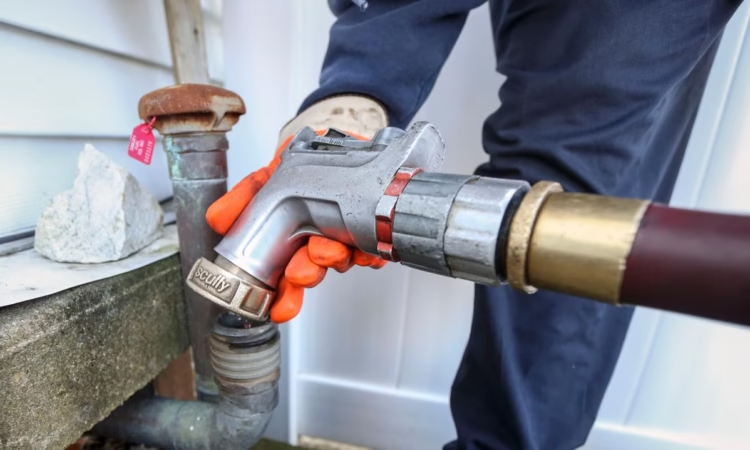
As a federally funded program to help utility customers pay for winter heating costs remains shut down, the cost of fuel to heat homes is on the rise.
The federal Home Energy Assistance Program is not accepting applications from homeowners, Newsday reported last week, as they face dropping temperatures in the coming days and weeks. HEAP normally opens Nov. 3, and suspension of the program tied to the federal government shutdown could leave those most dependent on the benefit with higher costs as gas and oil prices rise, state officials have said.
Meanwhile, National Grid is telling its approximately 600,000 Long Island customers to expect higher winter costs to heat their homes with natural gas.
“Average residential heating bills are expected to increase about 10.7%, or approximately $130 for the season,” National Grid spokeswoman Wendy Frigeria said in an email, noting the price is still below 2022 levels.
WHAT NEWSDAY FOUND
- Even as the federal Home Energy Assistance Program to help utility customers pay for winter heating costs remains shut down, the cost of fuel to heat homes is on the rise.
- National Grid is telling its approximately 600,000 Long Island natural gas customers that “average residential heating bills are expected to increase about 10.7%, or approximately $130 for the season.”
- Heating oil prices are also on the upswing. The average cost of a gallon of heating oil on Long Island jumped to $3.94 a gallon during the last week of October, a 6.6% increase from the prior year, according to a state dashboard.
Heating oil prices are also on the upswing. According to a state dashboard, the average cost of a gallon of heating oil on Long Island jumped to $3.94 during the last week of October, a 6.6% increase from the prior year and a 3.1% increase from the prior week. Oil prices on Long Island spiked last year in January to an annual high of $4.19 a gallon.
In November, PSEG Long Island’s total power supply charge on electric bills hit 12.78 cents a kilowatt-hour, a slight decrease from the prior month but a 13.5% increase from November 2024.
The state Office of the Temporary and Disability Assistance, which administers HEAP with funds from the federal government, said Wednesday that funds for HEAP are “delayed indefinitely,” pending the government shutdown it blamed on the Trump administration and Washington Republicans. (The White House blames Democrats.) Applications and payments for oil deliveries and utility bills usually start in early November.
“With federal funds for HEAP already delayed by weeks and counting, New York State is currently unable to open the HEAP program,” the office said in a statement.
Asked if Gov. Kathy Hochul planned to release any state money to temporarily fund the HEAP program as temperatures drop, spokesman Ken Lovett said, “We are exploring our options, but as the governor has said, no state will be able to backfill the severe impacts caused by the Republican federal government shutdown.”
As Newsday reported last week, some 48,161 National Grid gas customers on Long Island were 60 days or more behind in paying their bills as of September, owing more than $46.5 million. For PSEG, the figure is 108,739 customers with 60-plus days in arrears, owing more than $71.7 million, according to state figures.
At United Way of Long Island, officials are brainstorming ways to help some of the anticipated 70,000 Long Islanders who normally receive an annual $19 million in HEAP funding. Noting the increase in energy prices, chief grant officer Craig Fligstein said the agency is eyeing a separate initiative called Project Warmth, which normally starts in mid-December but could be opened sooner and made available to a larger contingent of people than is typical for the program.
“Right now the resources aren’t there,” he said. “As soon as the temperatures start to drop, I think the panic could set in. We would absolutely ramp up fundraising to serve more families.”
Project Warmth typically provides for some 2,000 customers each winter, working from a budget of around $1 million that includes support from National Grid Foundation, Northville Industries and PSEG Long Island.
Linee Matthews, a housing assistant at the Shinnecock Indian Nation, said her attempts to reach state administrators to apply for HEAP grants have gone unanswered in recent days. That’s on top of the loss of Supplemental Nutrition Assistance Program benefits and payments toward Section 8 housing, she said.
“It’s hard and it’s very scary that we don’t know what we’re facing in the upcoming days and months,” she said. The Nation is working with two nonprofits, Hamptons Community Outreach and Heart of the Hamptons, to provide food aid.
Matthews couldn’t say how many tribal members depend on HEAP, but noted at least 150 homes have residents who rely on SNAP.
“We have a lot of households here that are multi-generational,” Matthews said. “We have a high level of homelessness if you look at it from the perspective of a mother not living in a space for her family. People don’t realize that’s considered homeless when you are living two and three families together.”
The Public Utility Law Project, a utility watchdog, this week filed comments with the state Public Service Commission in support of an emergency petition filed by state utilities, including National Grid, to prevent low-income residents from being automatically disenrolled in their separate Energy Assistance Programs because of the frozen HEAP program.
“New Yorkers’ health and safety are at risk each day that passes without access to HEAP,” PULP wrote in comments to the PSC. “Due to these unprecedented times, PULP also believes that the [PSC and its DPS arm] should take additional expeditious action to protect the public by expanding enrollment opportunities and by implementing a residential utility service moratorium until at least 30 days after HEAP opens.”
Also impacted are programs to tune up, maintain and sometimes replace heating systems of impacted low-income households, said Brandon Vogel, spokesman for AARP.
The Heating Equipment Repair and Replacement and Clean and Tune benefits “have been cut for this year and next year,” he said in an email. The programs, he added, are “highly utilized among seniors.”
PSEG Long Island, which operates the electric grid for LIPA, said customers who received HEAP last year are eligible for PSEG’s Household Assistance Program, which can provide a discount of up to $78 per month for the next 18 months. They can use their last HEAP benefit as proof, the company said.
More information is available at psegliny.com/assistance or by calling its Consumer Advocacy Line at 631-755-3407 or email Consumeradvocacyli@psegliny.com.





